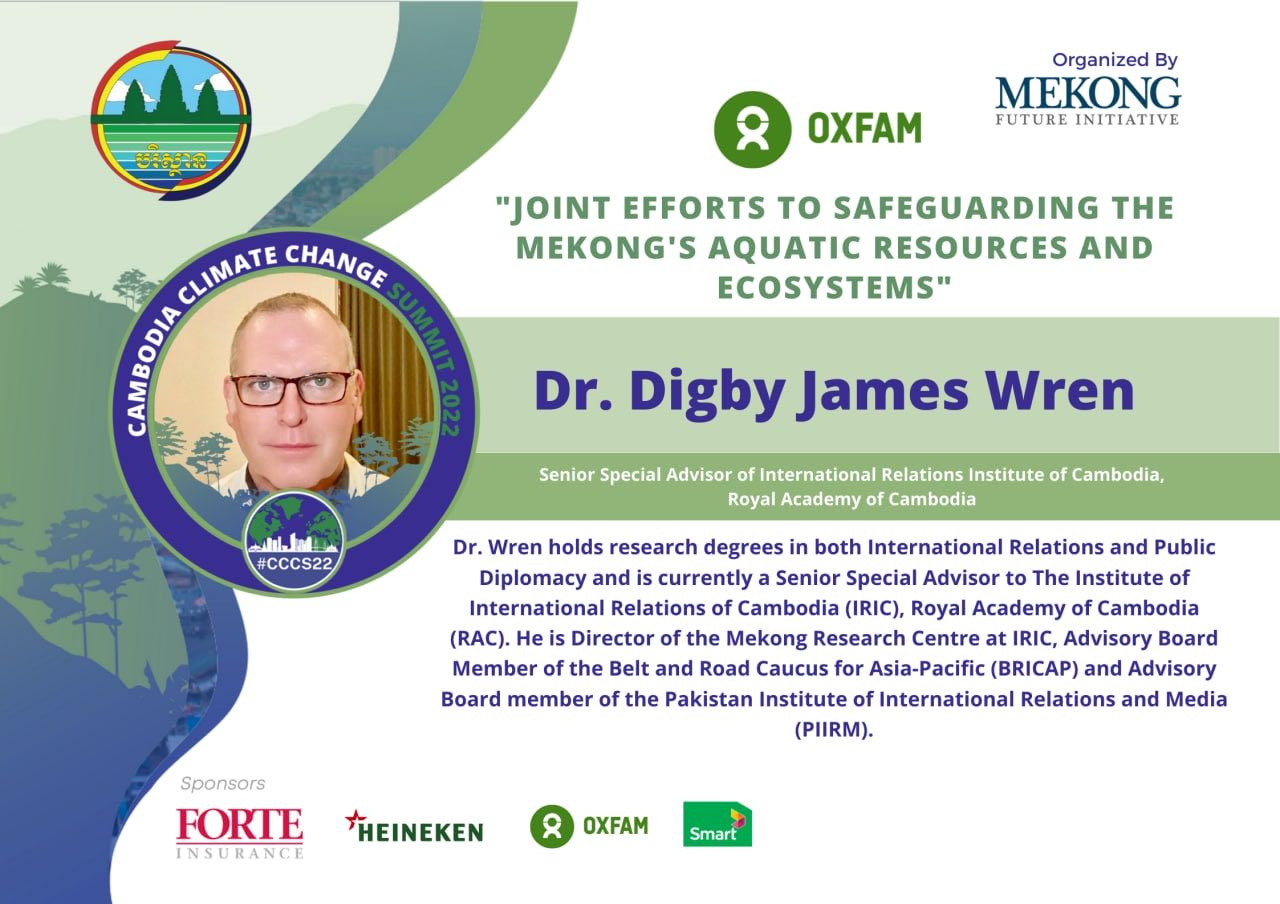Cambodia Climate Change Summit
Remarks by Dr. Digby James Wren on the Mekong Futures Initiative and Transboundary Cooperation
Background
In partnership with Mekong Future Initiative (MFI), Oxfam hosted the Panel Discussion on "Joint Efforts to Safeguarding the Lower Mekong’s Aquatic Resources and Ecosystems" in the Cambodia Climate Change Summit 2022 organized by Ministry of Environment of Cambodia held in Siem Reap, from 17 to 19 October 2022.
Mekong Future Initiative Objectives
1) to raise awareness among the public and river-dependent communities and call for more active participation and joint efforts to sustain the Mekong’s ecosystems and aquatic resources.
2) to hear from different views/perspectives from relevant experts and conservationist on possible ways to safeguarding the Lower Mekong’s aquatic resources and ecosystems.
3) to hear from different views of experts how could Cambodia improve transboundary cooperation to manage and safeguard the Mekong’s water resources and ecosystems.
Remarks by Dr. Digby James Wren in response to the question: If the initiative is possible, could it secure and safeguard the Mekong’s aquatic resources and ecosystems for sustainable livelihoods of river-dependent communities?
Firstly, let me congratulate the event organisors and fellow participants for such an important and timely forum.
River systems are not only the life-source for human kind, they are the planetary life-source for all existence. Why then, are approaches to riparian relations primarily conducted in terms of geographic proximity, resource extraction and human productivity? The health of the river is the health of the planet, source to sea, water and weather, flow and flood, banks and boundaries, flora and fauna, families and communities.
In philosophical terms one needs to ask the question: is nature a divine gift to man or is man only one small part of nature? This is important for determining human approaches to riverine significance in climate change, pollution control and resource extraction, as well as security problems such as fresh water and food supply, riverine trade and travel, power generation and artificial flow mediators such as dams and reservoirs.
Because geographic proximity is the most common human approach, divisions into territorial and material, national and international, upstream and downstream, Lancang and or Mekong, are charged with historic, social, cultural, political and security discourse and practice.
Thus, any Mekong initiative must primarily focus on the spatial and temporal health of the river and include human participation, not as a means to change the river and its environs, but to change individual and collective behaviour. As such, the river, like a mother, must be healthy to sustain all ecosystems before it can sustain massive human populations. In other words, any riverine discourse or practice which provides a diagnosis of river health by placing blame on the “other,” so, other communities, other countries, and or other practitioners, and then prescribes approaches which exclude the “other,” are not, and cannot be seen to be, primarily interested in the health of the river, but in the discourse that surrounds the health of the river.
This is in fact the greatest challenge to the establishment of a holistic and mutually beneficial cooperative framework for the diagnosis and prognosis of the Lancang/Mekong river systems health and prescriptions for its protection, rehabilitation, sustainability and perpetuity. The proposed initiative seeks transboundary cooperation, active community participation, and references the efforts of the Royal Cambodian Government and Prime Minister Hun Sen’s proposed ASEAN-wide Green Deal. While I welcome and applaud these efforts it must be noted that challenges abound.
Geographical proximity translates to interdependence at the most fundamental level, i.e. the health of the Mekong from its source in the Qinghai Tibet Plateau through vast swathes of China and into the five Mekong Basin countries. Thus, cooperation between the Mekong River Commission and the Lancang Mekong Commission, most recently a data sharing agreement, must be applauded. However, it should also be noted that larger non-regional partnerships do not always promote cooperation between the geographically proximate Lancang-Mekong River basin countries. This is fundamentally detrimental to initiatives such as the proposed initiative being discussed today.
In terms of community awareness and participation, environmental practice must be the overriding focus. Narratives that blame others do not stimulate productive actions at community level. Political socialisation programs that attempt to organise local communities to oppose policies and activities, has its place, but much greater effort needs to be directed toward the daily practices of interaction with the river and understanding community impact, including pollution, overfishing, sand mining, and encroachment.
To conclude, the global guidelines for action to protect and rehabilitate the Mekong river are provided by the 17 UN SDGs, the regional coordination is provided through ASEAN and its Social and Cultural Community 2025 program. These global and regional initiatives are increasingly being assimilated into the Royal Government of Cambodia’s policy framework and implemented at provincial, district and community levels. This is also true of the other five Lancang/Mekong countries, Laos, Vietnam, Thailand, Myanmar and China. Of the six Lancang/Mekong countries, it is China that is the most developed and most able to provide geographically proximate knowledge and resources. Moreover, approximately half of the rivers length and its actual source lay within China. The proposed initiative should include full partnership for the Lancang Mekong Six and engage greater participation from China at both the larger source to sea data collection and sharing while drawing on China’s community activation, poverty reduction and economic development strategies as well as its environmental and ecological experience and knowledge.
This and other initiatives should also coordinate more closely with the disparate and numerous other individuals, communities, NGOs and research centers, like the Mekong Research Center at the International Relations Institute of Cambodia at the Royal Academy of Cambodia, to promote increased coordination and cooperation and welcome extra-regional participation within the global, regional and local parameters I have discussed.
END




